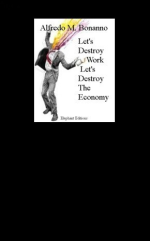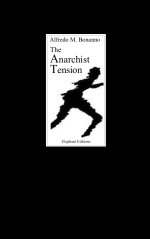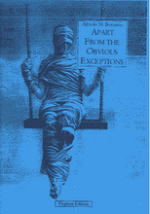Latest entries
Alfredo M. Bonanno
Let’s Destroy Work, Let’s Destroy the Economy
The old work ethic has disappeared along with the massive obsolete structures of capital which required a permanent army of producers, yet work still has far more implications than mere survival. Millions of people still compete for the privilege of turning up day after day, year after year, to surrender body and soul in exchange for a wage. The alternative: to encounter one’s real desires and create the means required to realise them, could present some surprises and lead to undreamed choices. A job, boring or arduous as it might be, is the easy way out. It gives structure to our day and puts order in our expectations, giving us just enough in our pockets to acquire instant sublimation and quell any sudden surge of hatred towards what is stealing our time and our lives.
Feb 20, 2017 Read the whole text...
Alfredo M. Bonanno
Locked Up
Prison has come out of the shadows into the limelight, as not a day passes without some allusion to ‘solving the problem’ of the State’s overflowing dungeons. Advances in surveillance technology are offering alternative models of isolation and control that could see a large number of the latters’ potentially explosive inmates defused and—opportunely tagged or microchipped—sent back to the urban ghettos of capital from whence they came. The main obstacle, bolstered by some retrograde attempts to gain votes through a sworn intractability concerning the ‘enemy within’, is power’s need for mass consensus from those it had led to believe that the State’s protection racket and promise of long custodial sentences were the ultimate social guarantee. The dilemma has given space to a whole range of social cops in an ongoing battle that the sycophantic media have not missed the opportunity to illuminate. The occult world of prison never fails to provide good headlines for those in search of a frisson, ‘enlightened discussion’ or fodder for animated pub talk (the latter often concluding with a call for the reinstatement of the death penalty).
Feb 20, 2017 Read the whole text...
Pierleone Porcu
Third World
The economic and social situation in the countries of the Third World has in no way changed from the beginning of the eighties, in fact it has regressed frighteningly, accentuating the inequality between rich and poor countries more and more.
Feb 20, 2017 Read the whole text...
Juan José Garfia
ADIÓS PRISIÓN
The story of the most spectacular escapes
This book talks about freedom, the urgent need for freedom and the impossibility of living without it. This book says that freedom must be taken back at all costs and that is exactly what the protagonists of Adiós Prisión, Spanish prisoners under the infamous FIES regime, did: they took back their freedom using all means necessary, challenging the impossible, ready to kill for it if necessary. There is no room for political correctness or abstract morals concerning human life here: if the screws keep you locked up and your life, even in its most banal and insignificant aspects, is at the mercy of their caprice, violence and stupidity, your only choice is to eliminate them if they put themselves between you and your freedom.
Feb 18, 2017 Read the whole text...
Alfredo M. Bonanno
I know who killed Chief Superintendent Luigi Calabresi
on May 17 1972, outside his house in via Cherubini 6, in Milan, at a quarter past nine in the morning
Basically, if we stop and think for a moment, what is there that we can be certain of? We get up in the morning, have a quick breakfast, rush to school, work, the nearest park to meet some friends, in a word, each towards their own daily business. In the evening we come back and lie between the sheets, nearly always the same as the evening before, where we can feel sure about the various events we have seen pass in front of our eyes during the whole day. As soon as some event takes place, no matter how simple, the coffee we had in the morning in the bar, everything surrounding it becomes confused, tends to suffocate in detail, and disappears in a non-requited desire for precision.
Feb 17, 2017 Read the whole text...
Alfredo M. Bonanno
Anarchists and action
Anarchists are not slaves to number but continue to act against power even when the class clash is at a low level in the mass. Anarchist action should not therefore aim at organising and defending the whole of the class of the exploited in one vast organisation to see the struggle from beginning to end, but should identify single aspects of the struggle and carry them through to their conclusion of attack.
Feb 16, 2017 Read the whole text...
Alfredo M. Bonanno
The Anarchist Tension
What is anarchism? It might seem strange that I should take up such a problem in this situation as I know for certain that there are many anarchists here, because I know them personally. And if nothing else, anarchists should at least know what anarchism is.
Feb 16, 2017 Read the whole text...
Alfredo M. Bonanno
And we will always be ready to storm the heavens again
(Against amnesty)
The Italian State had taken care to manage the vacuum left by the broken revolutionary movement long before revolutionaries started thinking about it. So anyone who starts shouting that any means are valid in order to free comrades from prison, should not complain afterwards that they find themselves standing alongside docile creatures who are no more than tools in the hands of power.
Feb 16, 2017 Read the whole text...
Alfredo M. Bonanno
Apart from the Obvious Exceptions
The appeal trial in Rome in which anarchists were accused of belonging to a clandestine armed organisation has concluded with higher sentences than those meted out on the previous occasion. That was in the logic of things. In my case I was sentenced to six years, i.e. an increase of two and a half years for a robbery in Rome which, needless to say, I know nothing about. If on the one hand the fact that there was no sentence for ‘armed organisation’ or ‘terrorism’ — to use the terms of the law — can be considered a defeat for the dogged zeal of general prosecutor Marini, the above-mentioned personage has every reason to feel pleased concerning the diatribes that this trial has led to within the anarchist movement.
Feb 16, 2017 Read the whole text...
Peter Kropotkin
The Conquest of Bread
Although The Conquest of Bread is undoubtedly one of the fundamental classics of anarchism, its present day validity is not as certain as it is linked to a precise situation of class struggle which cannot be easily clarified by referring to the analyses contained in the present volume. Put it aside? Consign it to the pleasing research of the historiographers, ever capable of giving a semblance of life to what has long been dead? Make a great task of separating the wheat from the chaff, patiently pointing out the parts that are still valid and those that are decidedly out of date? And, in such a case, what would remain of the unity of the work which, although accidental as it consists of pieces written at different times, cannot fail to leap to the eyes of even the most casual reader?
Feb 16, 2017 Read the whole text...
Series
Fragments
Work in Progress
Anarchist Pocketbooks
Kaleidoscope
Anarchist Pamphlets
Bratach Dubh
Detritus
Drafts
Déjà vu
Insurrection (PDF)
Contact
e-mail: elephanteditions [at] riseup.net
Distributions
In Europe, Elephant Editions are distributed by Active Distribution
In the United States, Elephant editions are distributed by AK Press
In Italy, Elephant Editions are distributed by Edizioni Anarchismo
Other distributions please get in touch.









